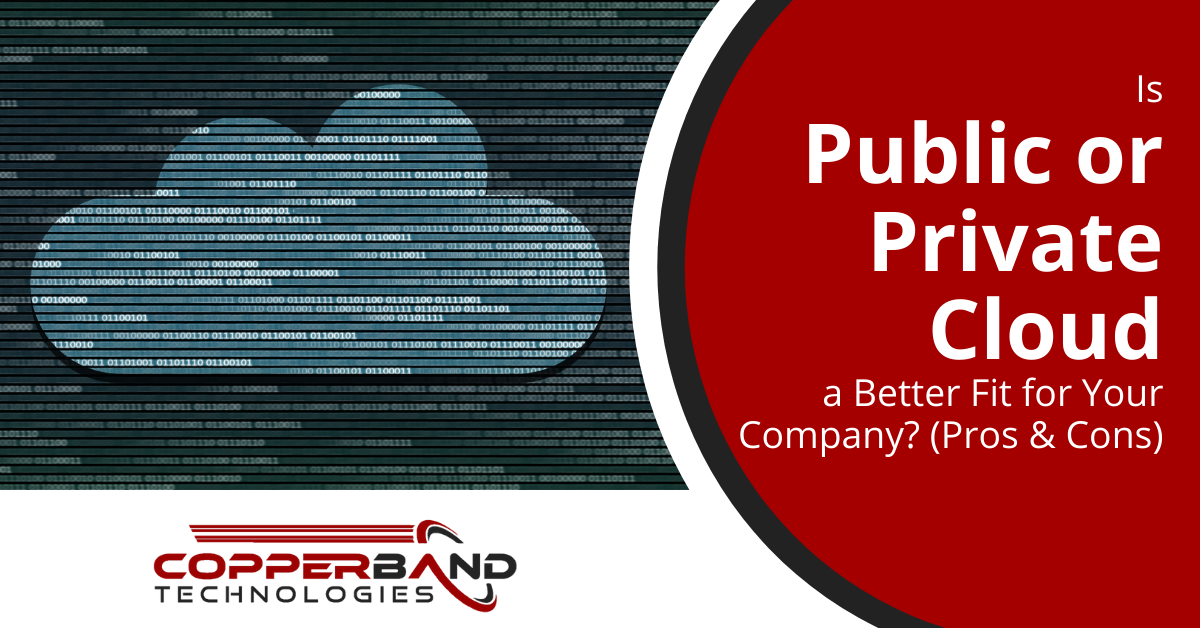Is Public or Private Cloud a Better Fit for Your Company? (Pros & Cons)

The cloud has long since gone from being a buzzword to being the norm in offices in Kentucky, Tennessee, and around the world. Without use of cloud applications that can be accessed from anywhere, many companies would not have been able to continue operating during the pandemic. Companies switched to working through remote teams, and many are planning to keep them even after the pandemic has passed. The number of employees working from home permanently is expected to double in 2021. Approximately 90% of companies use at least one cloud service, and 60% of them store confidential information in the cloud. Cloud adoption has become the “new normal” for companies. Now they’re moving to the next phase of the journey, which is optimizing use of the cloud for their future. This involves working out things like:
- How to reduce cloud waste
- The best way to integrate and automate cloud workflows
- How to eliminate app redundancies
- Whether to use the public cloud, private cloud, or a combination of the two
With the cloud being the future (and present) of how businesses get things done, it’s important that the entire infrastructure be set up strategically. This means answering the question: “Public or Private cloud?” Each type of cloud environment has its pluses and minuses. Both environments can also be used in conjunction, known as a hybrid cloud environment. We’ll go through the pros and cons of each type below so you can make a better-informed decision for your business future.
Public Cloud: Pros & Cons
Cloud services involve data centers full of servers that providers use to run their platforms and make them available for customers. The “public” cloud means that your data that you save in a SaaS tool (like Dropbox or Slack) is stored on a server. That server also houses the data of other companies using the application. The public cloud is the one that’s most common. When you sign up for an application like Microsoft 365, a mobile task manager, or another cloud tool, you’re most likely using the public cloud.
Pros of the Public Cloud
- It’s fast and easy. You sign up, and the environment is already in place and ready to be used immediately.
- It’s less expensive. Using public cloud is typically less expensive than hosting a private cloud.
- You don’t have to worry about maintenance. You don’t have to do any server maintenance when you’re using a public cloud. The SaaS provider handles everything for you.
Cons of the Public Cloud
- Less secure than private cloud. Your data is on a server along with other companies, so if one of them has an account breach, it could possibly mean the entire server is infected with malware, impacting your data too.
- You have less control. With the SaaS provider handling everything for you comes the lack of control. If you want to set up a certain process that goes beyond the tool’s user settings, you have limited ability to do so.
- You have to wait and hope if there is an outage. It’s not unusual for even large SaaS providers to have system outages. With public cloud, all you can do is wait for the outage to be over, you have no direct control of the server.
Private Cloud: Pros & Cons
A private cloud is a cloud server environment that is completely your own. No one else’s data is on the server. You have complete control over what is loaded on the server and you can configure it however you like.
Pros of the Private Cloud
- It’s more secure. You have the ability to set up any type of security policies that you like on a private cloud. In addition, you don’t have to worry about another company’s user causing a breach.
- You have total control. If the server goes down, you can have your IT pro address it and get the server back up and running immediately. No waiting around in the dark.
- Better Performance. Your resources are the only ones the server is running, thus private cloud servers tend to have better performance.
Cons of the Private Cloud
- Higher cost. Private cloud servers will typically cost more than public cloud because the whole server is being requisitioned for your organization.
- Might not be able to use all apps in private cloud. Not all SaaS providers offer the software needed to be able to load their tool on a private cloud environment. So, you may end up needing to use a hybrid public/private cloud workflow if there’s an app you absolutely need.
- You have to maintain the server. You have the responsibility to maintain the private cloud environment. This means regular upkeep, security updates, administration, etc.
Get Help Setting Up Your Perfect Cloud Framework
Copperband Technologies can help your Southern Kentucky or Middle Tennessee businesses choose the best and most effective cloud framework for your needs, and get it all set up for you. Contact us today to schedule a consultation! Call 931.263.8000 or email us.
